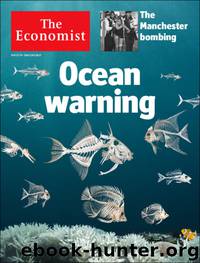The Economist by unknow

Author:unknow
Language: eng
Format: mobi
Tags: 新闻, The Economist
Publisher: calibre
Published: 2017-05-26T01:38:46.906000+00:00
Charlemagne
How Trump, Putin and Erdogan unsettle the EU
Liberal values and the rule of law meet capricious populism
May 25th 2017
THE mood is brighter in Europe these days. It has not, admittedly, taken much to lift the spirits: reckless extremists came second, not first, in elections in Austria, the Netherlands and France; economic growth has accelerated beyond a snail’s pace; and Brexit, though probably disastrous for Britain, may not be catastrophic for Europe. Still, even the return of normality is a relief for a continent that has spent the past few years battling crises.
But if Europeans have at last started to feel better about themselves, the world outside looks ever-more menacing. The cherished European values of liberalism and respect for human rights are being challenged by a cohort of unpredictable leaders who seem not to prize or understand them. This is unsettling for the European Union, a slow-moving club founded on reverence for the rule of law. For Europeans the shift is embodied in three presidents whose capricious impulses are shaping and constraining their foreign policy: Donald Trump, Vladimir Putin and Recep Tayyip Erdogan.
Take Mr Trump first. Europeans’ fears about the American president have partly eased since he took office. Mr Trump used to enjoy egging on anti-EU politicians like Nigel Farage and Marine Le Pen. However, after meeting various European leaders, he has largely stopped doing so. In February Mike Pence, the vice-president, reassured Eurocrats that America was not bent on destroying the EU. European officials, after visits to Washington, express optimism that some of Mr Trump’s more outlandish courtiers, such as Peter Navarro, a trade adviser who thinks America’s deficits threaten its security, have lost the president’s ear.
But Europeans are far from comfortable. “We have no idea where [the Americans] are on so many issues,” says a diplomat in Brussels, where Mr Trump was arriving for an EU meeting and NATO summit as The Economist went to press. That meeting was to be followed by a two-day summit of the G7 in Sicily. In the run-up to these encounters the Europeans hunted for clarity on America’s intentions, especially on climate and trade. During the campaign, Mr Trump vowed to withdraw from the Paris climate accord; he has neither reaffirmed nor revoked that pledge. (Alert to his “America first” approach to diplomacy, the Europeans have drawn up lists of American jobs that depend on clean energy.) The Americans have been reluctant to sign up to boilerplate language, in the G7 communiqué, on the importance of global trade.
If Mr Trump provokes questions for Europeans, Mr Putin challenges their assumptions. His Crimean land grab upset the post-cold war order, and his troops wreak havoc in Ukraine’s east. Weakness may limit the scale of what Mr Putin can accomplish. But Russia’s ongoing decline gives him a reason to act now rather than wait to disrupt pro-European reforms in countries that he sees as within his sphere of influence (although, happily, the EU has at last granted Ukrainians the right to visa-free travel). Inside the EU Mr Putin and his proxies meddle in elections and sponsor rabble-rousing parties and fake NGOs.
Download
This site does not store any files on its server. We only index and link to content provided by other sites. Please contact the content providers to delete copyright contents if any and email us, we'll remove relevant links or contents immediately.
Aircraft Design of WWII: A Sketchbook by Lockheed Aircraft Corporation(31780)
The Great Music City by Andrea Baker(21569)
Call Me by Your Name by André Aciman(18986)
The Art of Boudoir Photography: How to Create Stunning Photographs of Women by Christa Meola(17851)
Shoot Sexy by Ryan Armbrust(17151)
The Secret History by Donna Tartt(16656)
Plagued by Fire by Paul Hendrickson(16643)
Portrait Mastery in Black & White: Learn the Signature Style of a Legendary Photographer by Tim Kelly(16491)
Adobe Camera Raw For Digital Photographers Only by Rob Sheppard(16395)
Photographically Speaking: A Deeper Look at Creating Stronger Images (Eva Spring's Library) by David duChemin(16164)
Bombshells: Glamour Girls of a Lifetime by Sullivan Steve(13119)
Pimp by Iceberg Slim(12946)
Ready Player One by Cline Ernest(12861)
The Goal (Off-Campus #4) by Elle Kennedy(12444)
Art Nude Photography Explained: How to Photograph and Understand Great Art Nude Images by Simon Walden(12354)
Kathy Andrews Collection by Kathy Andrews(10550)
Thirteen Reasons Why by Jay Asher(7801)
Wonder by R.J. Palacio(7749)
Goodbye, Things by Fumio Sasaki(7740)
